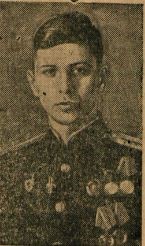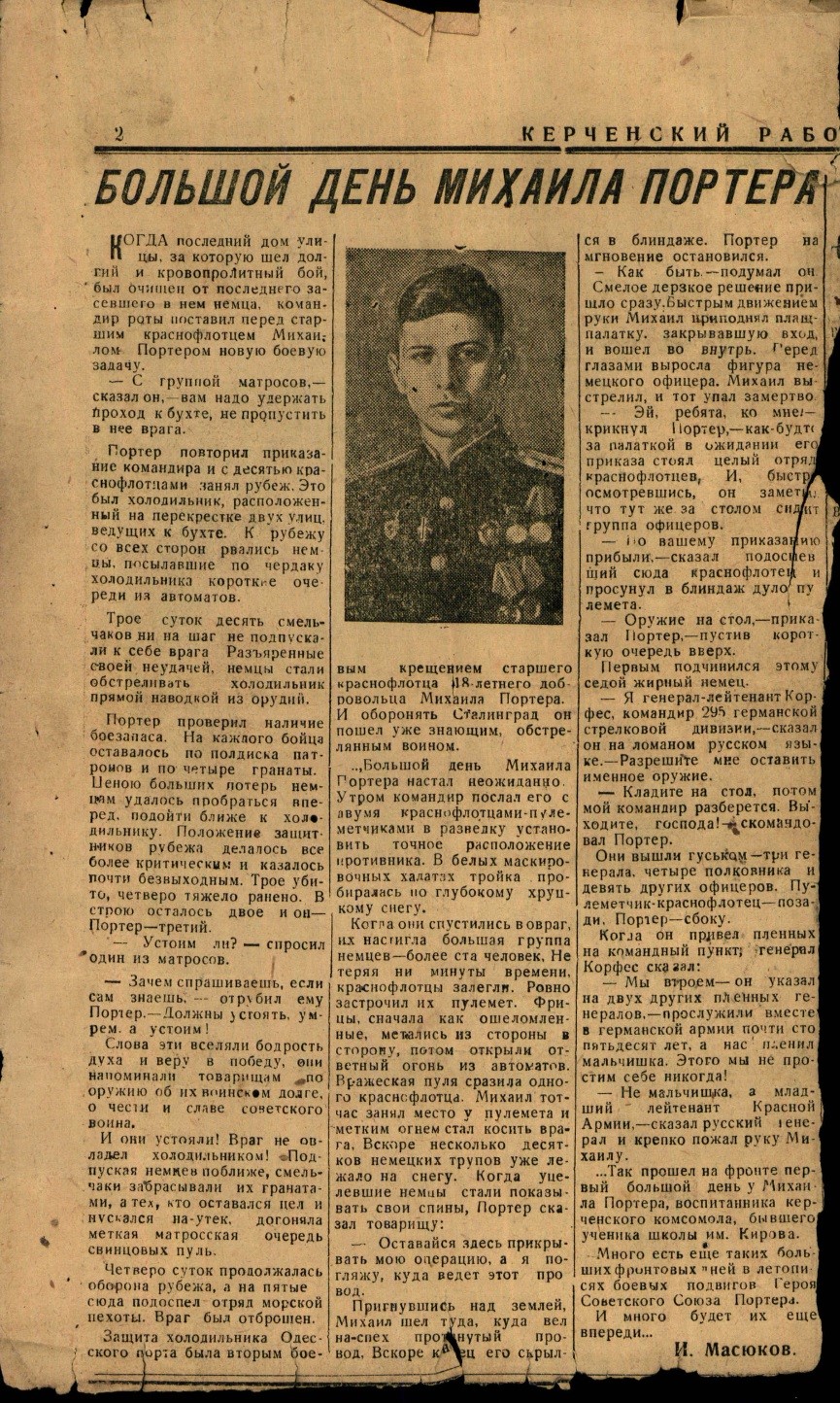Mikhail Porter was born in 1922 in Kerch in the Crimea. His father was the manager of a hotel. In 1940, Mikhail was drafted into the Red Army as a marine. From June 1941, the beginning of the Soviet-German war, Second Lieutenant Porter was at the front. In that year he took part in the defense of Odessa. In 1942 Porter fought in the Crimea and in the winter of 1942-1943 - at Stalingrad.
When the Soviets recaptured Kerch on December 30, 1941, the 91st Communications Regiment, in which Mikhail was serving, entered the city. There Mikhail learned that most of his family had been murdered by the Nazis during the November 1941 mass shooting of local Jews at the Bagerovo Ravine, 4 kilometers from the city. His mother, grandparents, and sister (or, according to another source, younger brother) were killed, but his father Miron was only wounded and succeeded in escaping from the ravine. A Russian woman named Valentina Sokolova, who had worked with him before the war, hid Miron and, thus, saved his life. In 2004 Yad Vashem recognized Sokolova as one of the Righteous Among the Nations.
"After the death of [members of] his family, which was annihilated by the Germans, Comrade Porter became a very ardent in the struggle for our Mother-country" – stated the official citation for his 1943 military award. After completing his service as a communications officer, Porter went around "hunting for Fritzes." In other words, he captured several enemy soldiers and killed a number of others.
On January 31, 1943, i.e. two days before the capitulation of the 6th Army of Army Group South in Stalingrad, Porter and three soldiers of the 62th Army captured the headquarters of the 295th Infantry Division of the 6th Army, including its commander, Major-General Otto Korfes. For this deed, Porter was awarded the Order of Lenin.
The tribulations of Mikhail's father did not end with the first Soviet liberation of Kerch (see above). Miron Porter was interrogated by the reinstated draft commission of Kerch and, together with ca. 600 other citizens of Kerch accused of evading the draft. He was sentenced to serve in a punishment battalion. Miron Porter was wounded and shell shocked several times. He was demobilized only at the end of 1945.
Mikhail ended the war in Berlin and was demobilized four month earlier than his father.
Neither Miron nor Mikhail returned to Kerch after the war. Mikhail Porter settled in Leningrad. He earned a law degree and served as a judge and a prosecutor in Leningrad and, probably, also in the Leningrad Region. Miron settled in Moscow and began to drink heavily. However, he succeeded in overcoming this habit. He remarried and moved to Kazakhstan. Miron Porter died in 1970.
Capture of a number German Generals
By evening soldiers of the 62nd Army had captured the headquarters of the [German] 295th Infantry Division, including its commander Major General [Otto] Korfes, and also the commander of the 51st Army Corps Lieutenant General of Artillery [Max] Pfeffer, who was stationed at the headquarters, and the chief of staff of the 295th Division, Colonel [Gerhart] Dissel, as well as several staff officers, a total of 16 people.
Remarkably, all of these 16 people, including Hitler's generals, were captured by three privates headed by the eighteen-year old [in fact, 20-year old] Komsomol member, communications officer Mikhail Porter who, before he was deployed in Stalingrad, had fought in the areas of Odessa, Sevastopol, and Kerch.
Here is how this happened:
On January 31, checking communication lines, Mikhail Porter came upon an enemy cable that, like a red streak, was curving along the snow-covered ground. Pleased at his discovery, Porter proceeded to follow the line.
Suddenly bullets began whistling by and he had to jump into a ravine. There he was joined by two soldiers who appeared as if from nowhere. […].
Porter noticed several bunkers close to him. A thick wire network ended at one of them.
"Stay here and I will look into these structures," Porter said to his comrades.
Before he could pull away the canvas that covered the entrance, the barrel of a rifle was pressed against his chest. Buy Porter was quicker: he shot first and a huge officer fell heavily at the entrance. A second officer suddenly appeared in the doorway. Porter shot again and burst into the dugout.
By the bright electric light, he saw many men, on whose uniforms military awards were shining.
The enemy officers and generals gazed with surprise and fear at their unexpected guest wearing a gray fur coat, a fur hat pulled back on his head, and with a gun in his hand.
"Hands up!" Porter shouted.
The Hitlerites immediately obeyed his order.
Porter ordered them to surrender their weapons and to get together their maps and documents. At that time, one of the soldiers accompanying him came to his aid. Together, they tool the disarmed prisoners out of the dugout.
One of the [Red Army] soldiers, who was walking in front, proceeded a few steps then fell, struck down by the bullet of an enemy sniper.
[In reaction] Porter arranged the captives into a circle, putting the guards in the center. Afraid to hit one of his own, the Hitlerite sniper stopped shooting.
But when they emerged from the ravine, the group came under heavy shelling. The second soldier who had joined Porter was wounded and fell to the ground […].
"Lift up the wounded" Porter ordered the prisoners.
Two officers picked up the wounded and carried him.
The high-ranking prisoners were taken to army headquarters.
For this brave feat, the secretary of the Komsomol organization of the communications regiment, deputy political instructor Mikhail Porter, was awarded the Order of Lenin."
(from Stupov А. D., Kokunov V. L. 62-ia armiia v boiakh za Stalingrad. Moscow: Voienizdat, 1953, pp. 105-106.) Stupov and Kokunov were two officers responsible for political matters in the 62nd Army. During and after the war they wrote memoirs about their unit.)








